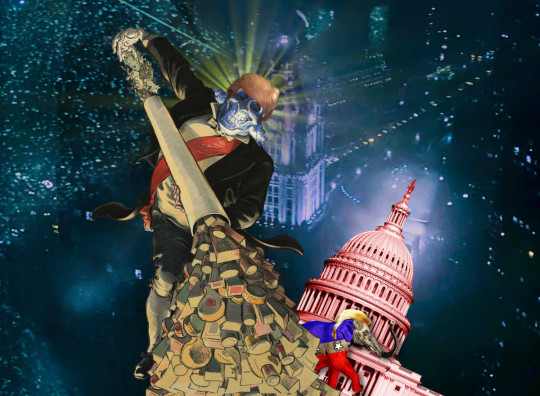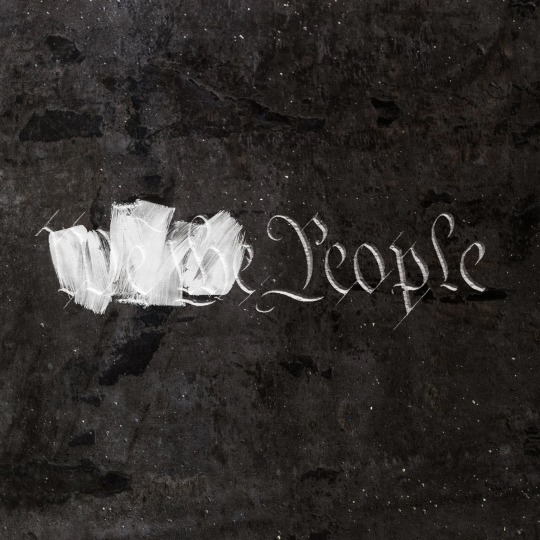#Corey Robin
Explore tagged Tumblr posts
Text
Winning coalitions aren't always governing coalitions

If you'd like an essay-formatted version of this post to read or share, here's a link to it on pluralistic.net, my surveillance-free, ad-free, tracker-free blog:
https://pluralistic.net/2025/01/06/how-the-sausage-gets-made/#governing-is-harder

Winning an election is easier than it looks: all you have to do is convince a bunch of different groups that you will use power to achieve their desires. Bonus points if you can convince groups with mutually exclusive goals that you'll deliver for them – the coalition of "people who disagree about everything" is hard to assemble, but it sure is large!
Politically, a "conservative" is someone who believes that there is a small group of people who were born to rule, and a much larger group of people who were born to be ruled over. As Corey Robin writes in The Reactionary Mind, this is the one trait that unifies all the disparate strains of conservative thought: imperialists, monarchists, capitalists, white supremacists, misogynists, Christian nationalists, Hindu nationalists and supporters of Israeli genocide in Palestine:
https://coreyrobin.com/books/the-reactionary-mind/
These groups all agree that power should be hierarchical, that your position in a hierarchy is something you're born with, and that letting people who were "meant" to be at the bottom of the hierarchy rise to the top puts society so out of balance that it's actually a threat to human survival. That's why conservatives of all stripes get so furious about "DEI" – any kind of affirmative action program serves as a defective sorting hat, putting the incompetent and unsuitable into positions of power over other peoples' lives. It's why "DEI" is the go-to scapegoat for any kind of disaster, including giant ships crashing into bridges:
https://www.axios.com/local/salt-lake-city/2024/03/26/baltimore-bridge-dei-utah-lawmaker-phil-lyman-misinformation
But while conservatives all agree that some of us are born to be in charge and others are born to be bossed around by our innate superiors, they have irreconcilable differences about who is meant to be in charge. British imperialists who pine for the Raj have views that are fundamentally at odds with the views of Hindu nationalists. They're both "conservative" movements, but they're actually bitter enemies.
For a conservative movement to win power, it has to convince the people whom it would relegate to the bottom of the hierarchy to support that goal (AKA "getting turkeys to vote for Christmas"); and it must convince other conservatives that they will be able to establish a hierarchy that accommodates multiple, co-equal ruling elites.
The first tactic is well-established. LBJ summed it up neatly:
If you can convince the lowest white man he's better than the best colored man, he won't notice you're picking his pocket. Hell, give him somebody to look down on, and he'll empty his pockets for you.
The second one requires far more tactical thinking. Some elite groups are able to form coalitions by carving out exclusive zones: think of the friendly feeling among Modi, Orban, Erdogan, bin Salman, Trump, Milei, et al. These people all aspire to dictatorship, all espouse their superior blood – a source of personal and racial superiority – and hypothetically all believe that the world would be better if everyone (including their foreign counterparts) would take their orders.
One way to resolve this tension is to carve up the world geographically, which is why so many despots who seized power by promising to build ethno-states can co-exist with one another and even cheer one another on. Let Orban have Hungary, give Turkey to Erdogan, and let Bibi Netanyahu annex all of Gaza. Sure, in their hearts of hearts, each of these men secretly believe themselves to be racially and personally superior to the others, but so long as they all stay out of one another's turf, there's no reason to make a big deal out of that.
Another way to resolve this tension is to carve up the world temporally: think of the alliance between Christian nationalists and Israeli genocidiers. In the USA, "Christian Zionists" outnumber Jews who identify as Zionists:
https://www.trtworld.com/magazine/qanda-for-every-1-jewish-zionist-there-are-30-christian-zionists-and-netanyahu-exploits-this-15656249
But Christian Zionists aren't philosemites. They hate Jews and believe that we are all going to hell for murdering Christ. Their support for Israel isn't grounded in a belief in the necessity of a Jewish ethno-state – it arises out of the apocalyptic belief that Christ will return once Jews "return to the Holy Land" – albeit only briefly, before being cast into a lake of fire for all eternity.
Like British imperialists and the Hindu nationalists, Christian Zionists and Jewish Zionists are not on the same side. However, unlike British imperialists and Hindu nationalists, Christian Zionists and Jewish Zionists want the same thing…for a while. Both groups support the establishment of a Jewish entho-state in Israel, they just differ sharply as to what happens after that comes to pass. So long as they don't dwell on that moment in the future, they can stand shoulder to shoulder, fighting together for an Israeli state that operates with absolute US support and total international impunity.
Coalitions who defer the question of how they'll use power to after they've gained power are using time (rather than space) as a buffer that keeps their differences from smashing together until they shatter. But time and space aren't the only buffers for the differences between coalition partners – there's also class.
"Class" has been the most important, most useful buffer for conservativism since the Reagan revolution. Reagan came to power by forging an alliance with evangelicals, whose cult leaders had historically demanded that members focus their energies (and cash donations) on the church, while avoiding politics as "worldly."
Reagan promised the Christian right a bunch of culture war stuff – bans on abortion, punishment for uppity women and racial minorities, prayer in school, segregation academies, etc – that his financial backers frankly didn't give a shit about. By all means, let working class evangelicals homeschool their kids and teach them that the Earth is 5,000 years old, it doesn't matter to Wall Street, who will reap a giant tax-cut and also send their kids to private schools with rigorous curriculum. Bankers' wives and daughters will always be able to afford to fly out of state (or across the border) for abortion care, they will never die of AIDS in the charity wing of a community hospital, their daughters won't be trapped by bans on no-fault divorces.
For the past 40 years, American oligarchs and would-be oligarchs have entered into enthusiastic coalitions with virulently racist, sexist and homophobic groups, and maintained peace within their coalition by passing punitive, cruel laws that the rich can buy their way around. For many self-styled libertarians, the most important liberty is "not paying taxes" and this subordinates all other liberties, such that a "libertarian" will vote for a coalition whose platform promises to ban abortion, birth control, "interracial" marriage, and queer sex, so long as it also promises tax cuts. It's a weird kind of pro-freedom ideology that happily trades away (others') freedom for (your own) tax cuts:
https://pluralistic.net/2021/09/29/jubilance/#tolerable-racism
Remember, Trump's first CPAC speech was sponsored by Goproud, a group of "fiscally responsible" gay Republicans who believed in gay rights, sure, but not as much as they believed in getting so rich that even if poor gay people were ground into dust, they could float above it all:
https://en.wikipedia.org/wiki/GOProud
Class is the third buffer between the oligarchs of the right and the mass movement that provides the bulk for winning elections. After all, laws are for the little people, so by all means, we can promise – and even deliver – laws that we would never submit to, because we don't have to submit to them. This is Wilhoit's Law in action:
Conservatism consists of exactly one proposition, to wit: There must be in-groups whom the law protects but does not bind, alongside out-groups whom the law binds but does not protect.
https://en.wikipedia.org/wiki/Francis_M._Wilhoit#Wilhoit's_law
In a hierarchical society, class separates groups of people just as rigidly as time and space, and is every bit as useful a buffer as the other two forces.
Until it isn't.
Eventually – once you've banned abortion, once you've taken all the "controversial" books out of the library, once you've made affirmative action illegal – you reach the layer of non-negotiable culture war demands that the rich can't buy their way out of.
Like immigration.
Let's start with this: immigration doesn't have to result in wage suppression. Couple immigration with strong unions and a muscular labor rights regime and workers do just great. The more the merrier! America needs workers of every kind. What's more, the unions and labor laws in America owe their existence to immigrant workers, so there's nothing about immigration that is necessarily incompatible with winning rights for workers.
But the possibility of importing some overseas union organizers isn't what motivates the finance wing of the conservative coalition to demand "guest-worker" programs like the H1B visa:
https://twitter.com/RobertMSterling/status/1873175206073626660
H1B visas are "non-immigrant" visas, meaning that they are designed not to offer any path to permanent residence or citizenship. You can live in the US for a long time on an H1B, but you are bound over to your employer like a serf bound to a feudal estate: if you lose your job, you lose your right to abide in the country. That can mean losing your house, your car, your kids' school and friends. It can cost your spouse their job, because if you're kicked out of the country, they might well leave along with you, rather than remain alone here.
H1B tech workers are the workers that tech-barons have dreamt of for decades. An H1B worker can't job-hop, and so needn't be lured to work with gourmet cafeterias, luxury gymnasiums, or other perks of the whimsical tech "campus." H1B workers can't quit if they don't like their stock-options packages:
https://pluralistic.net/2023/09/10/the-proletarianization-of-tech-workers/
Tech bosses hate tech workers, and they always have. It's not affection that causes Jeff Bezos to allow his coders to come to work with pink mohawks, facial piercings, and black t-shirts that say things their bosses don't understand, while his delivery drivers piss in bottles and his warehouse workers are injured at three times the national average. Jeff Bezos neither cherishes his coders' kidneys, nor is he especially hostile to delivery drivers' need to pee – he just squeezes any and every worker in any and every way he can.
Same for Tim Cook: the accomplishment that prompted Apple's board to elevate Cook to Steve Jobs' CEO office was the successful transfer of iPhone manufacturing to China. Specifically, Cook figured out how to work with his primary supplier, Foxconn, to create a working environment that produced reliable, precision-manufactured mobile devices, and all it took was creating a working environment so brutal that the company had to install suicide nets to catch the factory workers who couldn't stand it any longer:
https://www.theguardian.com/technology/2017/jun/18/foxconn-life-death-forbidden-city-longhua-suicide-apple-iphone-brian-merchant-one-device-extract
Apple's tech workers aren't worked to suicidal desperation, sure – but not because Tim Cook likes coders and hates factory workers. It's because he's afraid coders will quit, and he's not worried about replacing factory workers after they jump to their death.
The point of the H1B program is to create a tech workforce that bosses no longer have to fear. Recall that when Elon Musk took over Twitter and circulated a mandatory "extremely hardcore" pledge that demanded that workers promise to subordinate their health and wellbeing to his profits, it prompted a mass departure, with the notable exception of workers whose immigration status (and/or insurance for serious health issues) depended on their ongoing employment at Twitter:
https://www.theverge.com/2022/11/16/23462026/elon-musk-twitter-email-hardcore-or-severance
When Musk's cronies gloated about shedding 20% of Twitter's workforce on "day zero," the workers they had in mind were the ones who didn't fear their bosses and wouldn't frog when the investor class shouted jump. "Sharpen your blades, boys" means we're slicing off workers who are laboring under the misapprehension that they are entitled to a say in their working conditions:
https://techcrunch.com/2022/09/29/elon-musk-texts-discovery-twitter/
After all, America does not have a tech worker shortage. The US tech sector fired 260,000 skilled workers in 2023, and more than 150,000 were shown the door in 2024. When Musk and his fellow tech bosses complain that they need more "talent," what they mean is they need workers who are so terrified of being deported that they'll accept low wages, sleep under their desks, refuse to talk to union organizers, and, above all, do as they're told:
https://youtube.com/shorts/N0FkyXFhmpo?si=GCh6bFqd31prazhz
Trump won office by promising mutually exclusive outcomes to different parts of his coalition. To the nativists and bigots (and workers who'd bamboozled into thinking that their low salaries were the fault of other workers, not their bosses), he promised a halt to immigration. To the plutocrats, he promised a large and pliable workforce – of low-waged agricultural workers and of precarious H1B tech workers who'd discipline America's "entitled" tech workers:
https://prospect.org/labor/2025-01-02-president-musk-american-workers-h1b-visas/
Now, he has to figure out how to keep everyone happy. Literally: the Speakership of Congress is only nine votes away from collapsing at any time (and until last week, it was just one vote away), and without Congress, Trump's ability to govern will be severely curtailed (see, for example, 2018-2020).
Immigration isn't an issue like abortion: oligarchs can support abortion bans and still procure abortions when they need them. It's much harder to support an immigration ban and still procure precarious, low-waged workers for your business. It will take many years for American-born workers to be so brutalized and broken that they capitulate to the working conditions that American guest workers and undocumented workers accept, and bosses are impatient.
It's hard to put on a convincing performance of banning immigration, as the UK's New Labour discovered. In the years leading up to the 2010 election, Labour – under Blair and then Brown – made a big show of "cracking down on immigration." At one point, Home Secretary Jacqui Smith announced that she was axing dozens of UK visa categories, while carefully not mentioning these were so niche that hardly anyone qualified for them. This created chaos for the people affected and their families – I lost my own "Highly Skilled Migrant" visa at this time and we had to move our wedding plans up by eight months so I could stay in the country with my British partner and our daughter – but it didn't do anything to quench the xenophobic rage that UKIP and the Tories had been stoking, and Labour lost its next election.
American conservatives are rightly proud of their ability to form coalitions. They trumpet their ethic of "no enemies to the right" and contrast this with the "cancel culture" of progressives:
https://www.wired.com/story/the-year-democrats-lost-the-internet/
It's true that purging your ranks of coalition partners who disagree with you at the margins is a severely self-limiting move. It's also true that the broader your coalition is, the easier it is to win power.
The right has built a coalition of people who want opposite things. Infamously, Project 2025 isn't just a collection of terrifying ideas for running (and ruining) America – it's a collection of mutually exclusive terrifying ideas for running and ruining America:
https://pluralistic.net/2024/07/14/fracture-lines/#disassembly-manual
Trump's top health picks – RFK jr, Weldon, Oz, Makary, Bhattacharya, Nesheiwat – want mutually exclusive, irreconcilable things that are as impossible to compromise on as "banning immigration" while simultaneously "expanding the H1B program":
https://pluralistic.net/2024/12/20/clinical-trial-by-ordeal/#spoiled-his-brand-new-rattle
Big, diverse coalitions of people who normally oppose each other are great for winning power, but they're very bad for wielding power. Trump's majorities in Congress and the Senate are razor-thin, and while the Democrats had to suffer under the Manchin-Synematic Universe, the GOP's Klown Kar of Krazies has dozens of swivel-eyed loons who will happily blow up "must-pass" bills just for shits and giggles.
What's more, the GOP has spent decades installing easily blown circuit breakers into the American legislative and administrative systems, from the filibuster to the debt ceiling. By design, these allow small groups of lawmakers to kill bills and hamstring presidential power. Trump's first attempt at removing one of these breakers – the senseless kabuki of the annual debt ceiling showdown – was a total failure:
https://prospect.org/blogs-and-newsletters/tap/2024-12-19-debt-limit-should-absolutely-be-eliminated/
Musk thinks he can ram through policies that sizable portions of the GOP coalition would rather die than support. So far, Trump has proven a pliable puppet for Musk's ambitions. But the Musk-Trump coalition is every bit as fragile as any other in the GOP, and Trump is notoriously sensitive to accusations of weakness. Musk can threaten to primary any GOP lawmaker who gets in his way, but as the Kochs discovered after they unleashed the Tea Party, grievance-fueled, paranoid, heavily armed cults are hard to keep on a leash.
The coming months are sure to be an all-out war of GOP infighting as the coalition must wield power without the useful buffers of space, time and class. They'll be an object lesson in the dangers of a coalition that's so broad that everyone is welcome, even people who'd happily line you and yours in front of a firing squad.
But just because the right's attitude to coalitions is to have a mind so open its brains fall out, that doesn't mean the left should pursue a program of overwhelming ideological purity. Trump is a stupid guy with incoherent ideas, but look at how far he got by erecting such a big tent that anyone fit underneath it (even actual Nazis).
The progressive coalition doesn't need to be that big. We can have enemies to the right. The hugs Kamala Harris bestowed on ghouls like Liz Cheney didn't win the election, and the medal Biden just gave her won't help either:
https://www.nytimes.com/2025/01/02/us/politics/presidential-citizens-medal-liz-cheney.html
Manchin and Synema can "fuck off until they come up to a gate with a sign saying 'You Can’t Fuck Off Past Here,' Climb over the gate, dream the impossible dream, and keep fucking off forever":
https://michaelmarshallsmith.substack.com/about
But the fact that some people don't belong in a progressive coalition, it doesn't follow that there's no room to make the coalition looser and broader. Sure, a big coalition makes it hard to wield power, but without that coalition, we'll never win power.
#pluralistic#coalitions#political science#gop#h1bs#immigration#no enemies to the left#no enemies to the right#conservativism#josh ganz#corey robin#the reactionary mind#project 2025#poli sci
303 notes
·
View notes
Note
Thoughts on Corey Robin's THE REACTIONARY MIND? And, if a book by an author with opposite ideologies were to exist, what might be the thesis of, let's say, Robin Corey's THE PROGRESSIVE MIND?
(I actually think you discussed Robin previously, but with your daily word count rivaled only by Crichton or PKD, of course I have no idea where to find it. When's that indexed THE COLLECTED POSTS OF JOHN PISTELLI, Volume 1 coming out? Because, honest to God, you should self-publish, at minimum, a "best of" collection.)
YA intellectual history. Good guys and bad guys, everything on each side is everything else on that side, Edmund Burke is Friedrich Nietzsche is Sarah Palin. The only thing that rescues it is his obvious and helpless admiration for the reactionaries: those would-be saviors of a system to which they are mostly outsider-aspirants, their sometimes gratuitous resistance to the tide of history giving them a richer and more disillusioned appreciation for power than that enjoyed by those who, in Robin's first sentence, "marched against their superiors in the state, church, workplace, and other hierarchical institutions."
(Also, and I know this is petty, but I'm not sure about the ethics of passing off a collection of occasional magazine writing as a scholarly treatise.)
I think that with The Rebel, Camus has already written The Progressive Mind, though it takes a grander and more abstract approach to the subject. Camus knows what goes through the heads of those marchers, those troupers. He knows, because he was one, because he is not a reactionary, of the progressives' deep, unspoken desire:
To kill God and to build a Church are the constant and contradictory purpose of rebellion.
Because Robin never acknowledges the second part of that formula, he also never acknowledges that Burke and Nietzsche might have been alert to a genuine existential (and not merely circumstantial) danger that Paine and Marx missed. (Though Camus, reasonably enough, groups the God-killer Nietzsche with the progressives.)
On my word count, it's like Updike said of himself: I write faster than I read. On The Collected Posts, someone will have to pay me to do that. Unless and until I see a check, I am content to let everything I've written online vanish into the ether whenever the internet inevitably does; as far as I'm concerned, only my fiction is real.
3 notes
·
View notes
Text
1 note
·
View note
Text
youtube
Arkle Tier Ranks Books He Read From 2019 - 2024 (Part 1)
-
Before I started editing, I had this fantasy that I would somehow be able to get this under 2 hours. Instead, it's going to be a 2-parter. Part 2 will go up tomorrow. The Tier template I made: https://tiermaker.com/create/books-arkle-read-read-from-2019-to-2024-17973852 The "Beach Read" video: https://www.youtube.com/watch?v=_0BTtdOvdO4 "'HATE' monologue from I have no mouth and I must scream but with tiktok TTS": https://www.youtube.com/watch?v=74jfnTczdG4 Merphy Napier: https://www.youtube.com/@merphynapierreviews The Innuendo Studios video I referenced when talking about The Reactionary Mind: https://www.youtube.com/watch?v=E4CI2vk3ugk Like this show? Remember to Like, Share, & Subscribe. Also, if you can, please support this channel on Patreon: https://www.patreon.com/arklestudios Or you can give a one-time donation at Ko-Fi: https://ko-fi.com/arkle0862 Want to contact me? You can find me on Tumblr (thehumanarkle.tumblr.com), BlueSky (@arkle.bsky.social), SpaceHey (https://spacehey.com/profile?id=1528657), or Mastodon (@arkle)
#arkle studios#tier ranking#books#2019 to 2024#naomi klein#corey robin#connie willis#nicole maines#ghostbusters#youtube videos#tier ranking videos#Youtube
0 notes
Text

Illustration of Painting Over the Words ‘We and The’ Leaving Only the Word ‘People’ Legible. By Nicholas Konrad/The New Yorker
How Do We Survive The Constitution?
In “Tyranny of the Minority,” Steven Levitsky and Daniel Ziblatt argue that the document has doomed our politics. But it can also save them.
— By Corey Robin | October 4, 2023
Donald Trump caught academics off guard. Historians and social scientists had long studied the American right, amassing a vast library on its relationship to race, gender, sex, the media, the Cold War, religion, and big and small business. Less explored was the role of the Constitution, which has always been more friend than foe to the American way of repression. This gap in the literature left the field wide open for experts in authoritarianism abroad and scholars of authoritarianism past.
The most important contribution to this genre was “How Democracies Die,” by the Harvard political scientists Steven Levitsky and Daniel Ziblatt. Studying how democracy was undermined elsewhere, Levitsky and Ziblatt defined the threat of Trumpism as an attack on the Constitution, the rule of law, and institutions. They also claimed that these pillars were less sturdy than people supposed. The Constitution was riddled with holes. Restrictions on Presidential prerogatives were not written down. Institutions designed to check extremists, whether specified in the text (a bicameral legislature) or not (political parties), were vulnerable to extremists.
Most worrisome of all, the ligaments joining these parts, what Levitsky and Ziblatt called “norms,” were frayed. Two norms in particular—tolerance of one’s opponents and forbearance in the exercise of power—were foundational to constitutional democracy. But since 1965, 1994, or 2010 (Levitsky and Ziblatt never settled on a date), those norms had been eroding. Traditionally, élite “gatekeepers” had been the custodians of norms, exercising “peer review” over norm eroders such as Charles Lindbergh and George Wallace. But, in the wake of reforms initiated by the Democrats after 1968 (another date), and later copied by the Republicans, ordinary voters, rather than insider élites, were empowered to choose the Presidential ticket of each party. For a while, the establishment held the line against outsiders. Then came 2016, when Republican leaders failed to stop Trump and rallied behind him.
Within a month of its publication, in January, 2018, “How Democracies Die” hit the Times best-seller list. It’s easy to see why. The book gave voice to liberals who felt betrayed not by their country but by its voters, the gate-crashers who put Trump into power. Levitsky and Ziblatt’s readers believed in norms, trusted élites, and valued institutions, particularly the Supreme Court. They revered the Constitution. The problem was the half of the country that didn’t.
But spring came, as it does, and a new wind began to blow on the left. After the confirmation of Brett Kavanaugh, Neil Gorsuch, and Amy Coney Barrett, progressives started seeing the Court less as a counter to Trumpism than as its conduit. “Defend institutions” may have made sense at the beginning of Trump’s reign. By the end, it sounded like a call to protect the Electoral College and other struts of the right. In 2018, Levitsky and Ziblatt had recommended building coalitions with “red-state Republicans,” abandoning abortion as a litmus test for candidates, and making unnamed but “tough” concessions to moderate voters. Now liberals were ready to play hardball: abolish the filibuster, pack the Court, admit new states to increase Democratic votes in the Senate, and stop all coöperation with the G.O.P.
None of this agenda has been enacted, but its pressures are felt throughout “Tyranny of the Minority,” Levitsky and Ziblatt’s follow-up to “How Democracies Die.” There’s little talk of norms in the new volume. Instead, Levitsky and Ziblatt reaffirm the call to end the filibuster and remake the Court, norm-eroding measures they previously cautioned against. More surprising is their revised view of democracy itself. The primary threat to the system is no longer demagogues; it’s the very institutions that Levitsky and Ziblatt once rallied readers to protect. If the United States is to remain—really, become—a democracy, Americans must stop treating its founding text “as if it were a sacred document.” The Constitution, the deepest norm in American politics, must be eroded.
In 1857, the British historian and statesman Thomas Macaulay set out a grim forecast for the United States. In Britain, political power was safely tucked away in the pockets of élites, who were “deeply interested in the security of property.” America had foolishly handed power to the “discontented” masses. For now, there was land for them to settle in the West. But, when that safety valve failed, the working classes, “none of whom has had more than half a breakfast, or expects to have more than half a dinner,” would vote to strip the minority of their wealth. The Constitution wouldn’t stop them. It was “all sail and no anchor.”
For much of American history, it’s been the reverse: all anchor, no sail. The most influential authors of the Constitution were terrified of democratic majorities. They devised a government with a sluice of filters—at least six, which Levitsky and Ziblatt note is “an unusually large number”—to push majorities to the side. More than two centuries later, we still have this “uniquely counter-majoritarian democracy,” which is hardly a democracy at all.
Congress has two of the filters. A bicameral legislature is one; the Senate is the other. Many countries have learned that, in a real democracy, upper chambers either don’t exist or have highly limited powers. The U.S. Senate doesn’t just have power equal to (and, in some cases, greater than) the House; it also represents states rather than individuals. Wyoming, with a population of about five hundred and eighty thousand, has as many votes as California, which has nearly forty million people. There’s a reason that most democracies don’t operate in this way: it’s undemocratic. This has been apparent for centuries. All of the antislavery bills that passed the House between 1800 and 1860 were killed by the minoritarian Senate.
If the House and the Senate agree on a bill, they still need the approval of the President, who’s elected not by the voters but by the Electoral College. That’s the third filter. With a bias toward smaller states and a winner-take-all structure, the Electoral College can send the loser of the popular vote to the White House. In this century alone, that’s happened twice.
Even if the elected branches agree on a bill, the Supreme Court can strike it down. Justices are put on the bench by the Senate and the President, so we can have a Supreme Court majority, like the one we have now, created by a combination of Presidents who lost the popular vote and senators who represent a minority of the voters. That’s the fourth filter, a creature of the preceding three.
Meanwhile, another course runs parallel to the national one. Our federal system, the fifth filter, grants states tremendous power, including the right to design electoral rules—how district lines are drawn, who can access the ballot, how elections are conducted, and so on—that privilege minorities over majorities. Between 1968 and 2016, the party with fewer votes has won a state house a hundred and twenty-one times and a state senate a hundred and forty-six times. Those legislatures, in turn, can gerrymander federal election districts, turning the putatively majoritarian House into another counter-majoritarian chamber. They also can pass laws, such as bans on abortion, that abridge the most basic freedoms of the people.
Many nations entered the twentieth century saddled with the yoke of counter-majoritarianism. They got rid of it. We haven’t, thanks to our mega-counter-majoritarian requirement for constitutional change, which is the sixth and most important filter. Two-thirds of both houses in Congress propose an amendment, and three-fourths of the states must then ratify it. According to Levitsky and Ziblatt, a political scientist has devised something called the Index of Difficulty to measure how hard it is to change a country’s constitution. Ours tops the list, by a wide margin.
This news comes at a bad time. Today’s Republicans—many of them white and living in rural areas—hold fast to the Constitution for protection against Democratic majorities. Those majorities increasingly live in large cities, where the jobs are, and many of those cities are in highly populated, Democratic states. The combination of these factors leaves blue voters vulnerable to malapportionment in the states, where they needlessly pile up their votes in cities, and in the Senate and Electoral College. A minority of voters can now inflict a legislative wallop of racism, sexism, nativism, homophobia, transphobia, and economic misery on the rest of us—and never have to pay for it at the polls.
This is the “tyranny of the minority” that Levitsky and Ziblatt rightly fear. No lawless strongman or populist autocracy, it’s a product of the very Constitution that we have been taught to admire.
Once we set aside the compass of the Constitution, where should we look for our North Star? Levitsky and Ziblatt point to “multiracial democracy.” Either we become a multiracial democracy or we cease to “be a democracy at all.” The battle, in other words, is existential.
Yet Levitsky and Ziblatt aren’t equipped for war. Like many analysts, they believe that today’s right is driven by a primitive fear. Conservative voters fear the simple fact of demographic change. As immigrants, people of color, women, and sexual and gender minorities assume greater visibility, dominant groups—straight, white, cis, native-born men—fear a loss of status. That fear of erasure fuels the G.O.P.’s “turn to authoritarianism.” Holding on to government power is an “existential” imperative for the Party and the groups it represents.
This argument, now ubiquitous on the left, has come to seem like a natural law of the political universe, describing our most elemental drives of identity and anxiety. It makes sense that conservatives would believe it, as they’ve been pushing it since the French Revolution. But it poses a problem for the left, and for Levitsky and Ziblatt, in particular.
If dominant groups can get members of subordinate groups to identify with them, they may not need minoritarian tyranny to stay in power. That scenario is not as far-fetched as it may sound. Until recently, that was the story of the American right, whose foot soldiers created large voting majorities and cultivated explicit support for big business from the ranks of its victims. Whiteness is insidiously capacious, forever incorporating new arrivals into its enveloping fold. Small shifts of nonwhite voters away from Democrats and the rise in the number of Republican candidates of color suggest that this phenomenon remains salient, even in the age of Trump. In today’s environment, where elections are won at the margin, the effects can be lethal.
More important, if the laws of identity and anxiety are as primal and potent as many progressives believe, resisting those laws risks turning the left’s project into a purely moral crusade, an exhortatory ought against the right’s is. Levitsky and Ziblatt call themselves political realists, yet they often resort to an earnest moralism to explain the world. What makes politicians capitulate to authoritarians in their midst? The absence of courage. How will multiracial democracy be advanced? By “loving America with a broken heart.” “History is calling again,” and “future generations will hold us to account.” More than a lapse in style, platitudes like these, stacked one on top of the other, reveal how difficult it has been for progressives, of all stripes, to mount a political argument for democracy.
Levitsky and Ziblatt are refreshingly clear that only a popular movement can create the constitutional reforms that democracy needs. But they define democracy narrowly, as “a political system with regular, free, and fair elections in which adult citizens of all ethnic groups possess the right to vote” and “enjoy equal protection of democratic and civil rights.” Quoting the political scientist Adam Przeworski, they add that it is “a system in which parties lose elections.” Given this straitened sense of what a democracy can do, it’s not clear why any contemporary movement would take on the task of creating it. It’s probably no accident that, thus far, none really has.
It wasn’t always so. The United States has seen many movements for democracy. The successful ones have treated the Constitution not simply as a document of constraint, weaponized by the courts and politicians, but as a charter of expanding freedom, wielded by and for the people. As Joseph Fishkin and William Forbath detail in their wonderfully counterintuitive book, “The Anti-Oligarchy Constitution,” the very document that Levitsky and Ziblatt are so dissatisfied with is annotated with statements of astonishing democratic vision, penned by the great social movements of the past.
From the earliest days of the Republic, those movements insisted that the greatest threat to democracy is not the tyranny of one man but the oligarchic rule of wealth. Poor citizens, at the mercy of richer ones, could not be full citizens. More than a moral or political argument, this is a foundational claim about the Constitution and the economy, or what we might call the political constitution of the economy. When we think of the Constitution today, our minds drift to civil rights or to the obstacle course described by Levitsky and Ziblatt. Historically, Fishkin and Forbath remind us, Americans have thought of the Constitution as a weapon in the struggle for economic equality, as a real presence in their material lives.
Among the most successful movements against oligarchy were the Populists and Progressives, who used the document to treat the disabling economy of the Gilded Age. At the end of the nineteenth century, land promised to farmers in the West was gobbled up by banks, railroads, speculators, and cattle companies. Suddenly jobless, a new proletariat scuttled back East, praying for work in factories and cities. “Unemployment” appeared as a census category for the first time. Vagrants shattered store windows to get a bed for the night in jail. Meanwhile, the top one per cent owned half of the wealth.
When the United States was an agricultural society, distribution of property seemed like the fount of equality. But, as Macaulay anticipated, industrial capitalism—with its wrenching shift to wage labor, complex production lines, and corporate behemoths—had rendered that vision moot. The Populists and Progressives realized that they needed a new conception of democracy, one tied less to physical notions of land and labor than to the social facts of economic combination and coöperation. Mass parties, labor unions, public schools, strikes and boycotts, social insurance, minimum-wage laws, state banks and currency reform, antitrust regulation, income taxes, even economic planning: these were the new priorities, the material resources of freedom. They deserved all the constitutional fervor and protection that once attached to yeoman land.
In their quest to enact these changes, the Populists and Progressives hit a familiar wall—the Senate and the courts. The Senate was “a paradise of millionaires,” one critic cried. Edgar Lee Masters, the author of “Spoon River Anthology,” wrote that “plutocracy appoints the federal judges.” After Grover Cleveland sent in the troops to crush the Pullman Strike, which was organized by thousands of railroad workers, Illinois’s governor declared that “never before were the United States government and the corporations of the country so blended.”
Instead of accepting oligarchy as the inevitable consequence of the Constitution, the Populists and Progressives looked for alternatives in the text. Through a close reading of James Madison’s notes and papers, they uncovered an argument for the national government’s design and regulation of the economy. In the commerce clause, they found a tool for Congress to “secure the Blessings of Liberty,” which later proved critical to the passage of the Wagner Act—the cornerstone of workers’ right to organize unions—and the Civil Rights Act. The Gold Standard, which enriched bankers and burdened farmers, was deemed a violation of the equal-protection clause. And, in a brilliant marriage of substance and strategy, the Progressives joined forces with the feminist movement, arguing that women voters would help strengthen child-labor laws, health and safety protections, and so on.
By insisting that “the people are the masters of their Constitution,” these armies plowed through Levitsky and Ziblatt’s sixth filter. In rapid succession, the country adopted the Sixteenth Amendment (1913), which gave the government the power to enact an income tax; the Seventeenth Amendment (1913), which established direct election of senators; and the Nineteenth Amendment (1920), which secured for white women the right to vote. The amendments were linked. A democratically elected Senate would lead to income taxes that, by the middle of the twentieth century, were the envy of social democracies across the globe. The right to vote would empower women in the household economy, overturning what Susan B. Anthony had called the most “hateful oligarchy” of all, the “oligarchy of sex.”
Fishkin and Forbath also push against the reductive identitarianism of today’s defenders of democracy. Any movement of constitutional reform requires racial and gender equality, and vice versa. But the laws and norms of race and sex are part of the economy, from the distribution and rewards of labor, in the household and the workplace, to the operations of finance and the regulation of marriage and inheritance. To overcome oligarchy—and Levitsky and Ziblatt’s tyranny of the minority—that political economy must be remade.
Reconstruction and the New Deal offer instructive examples. “By building up a ruling and dominant class,” the congressional Joint Committee on Reconstruction declared, slavery “produced a spirit of oligarchy averse to republican institutions.” Slaveholders had accumulated vast wealth and power, not just through enslavement but by forcing wage workers, Black and white, in the North and South, to accept harsh conditions on the ground that they weren’t as bad as slavery. The slaveholders also thwarted a much-needed land-grant bill for public colleges and universities, fearing that any exercise of federal power might be turned against them.
Because the slaveholders’ power derived from a racial caste system, labor exploitation, and a privileged position in government, the leaders of Reconstruction vowed to destroy all three. Like the amendments of the Gilded Age, the Reconstruction amendments linked profound changes in political economy (the end of enslaved labor and an extensive expropriation of private property, in the case of the Thirteenth Amendment) to a democratization of the political process (the right to vote for Black men, in the case of the Fifteenth Amendment). The Fourteenth Amendment—which included the citizenship clause, the equal-protection clause, and the due-process clause—transformed the standing of many Americans, and each amendment gave Congress the unprecedented power to take “appropriate” action to insure its enforcement.
Leaders of the New Deal followed a similar course. “A small group,” Franklin Delano Roosevelt announced in 1936, had “concentrated into their own hands an almost complete control over other people’s property, other people’s money, other people’s labor—other people’s lives.” Now the enemy was a coalition of pro-business Republicans and white-supremacist Democrats, whose power depended on stifling a multiracial social democracy. Advocates of the New Deal saw it as the continuation of Reconstruction. The Thirteenth Amendment became the rallying cry of organized labor, inspiring half a million Black workers to join the ranks of the newly formed Congress of Industrial Organizations. New Deal officials, the N.A.A.C.P., labor organizers, and Communist Party activists fanned out across the South to rally Black workers and tenant farmers. Summarizing the movement’s credo in 1945, the Black legal theorist Pauli Murray wrote that the only way to end racial discrimination in the workplace was to create a full-employment economy for all. Civil rights meant social democracy.
We’ve come to think that Reconstruction and the New Deal were defeated by racism and violence in the factories, fields, and streets. But the higher reaches of reaction took a different form: severing race from class and class from race. If overthrowing oligarchy required racial equality in the economy, the oligarchs could best maintain their position by hiving off civil rights from economic issues. Beginning in the eighteen-seventies, reactionary courts and liberal politicians narrowed the meaning of the Reconstruction amendments, applying them to Black Americans only, rather than to workers as a whole. Freedom from economic domination had no friend in the Constitution; with time, neither did Black America.
In the wake of multiple defeats in the late nineteen-forties and early fifties, the New Dealers reached a different settlement. Hoping to end decades of judicial activism on behalf of big business, they agreed that economic questions would be left to Congress and the President. Meanwhile, the Court, assuming sole custody of the Constitution, would tackle racial (and, later, gender and queer) equality. That settlement came to haunt the left, as Republican Presidents appointed more and more conservative Justices.
This is the real story of the Constitution. A document of and for the people has become, for one half of the country, a structural support, and, for the other, an imperilled instrument of the marginalized. The choice seems clear. Return it to the people or scrap the whole damn thing. ♦
0 notes
Text
Can't find it now but there was that confessions post where anon was like "Why are curt and corey (Lubowich) even interacting with the fandom on tumblr, it makes me uncomfortable, especially on a confession account like aren't they supposed to be free of judgement- idk i just don't think this space is for them" and I think that is possibly the most chronically online, go-and-touch-grass take that I've seen in a hot second, and I need to rant about it.
Anon be so fucking for real are you telling me that the people who's media you consume have to limit their internet experience because you don't want them to see what you are saying about their work on the internet? Is that a Joke? If you post an opinion anonymously, that does not make your take free from judgement. People can see it and judge it all they want- it just means it cannot be traced back to you. In fact, confessions pages are DESIGNED to inspire discussion and judgement based on the confession! How entitled do you have to be to see Curt Mega giving his opinion on a character HE PLAYS in response to some anonymous comment and go "Waaa Why is he even here anyway??" He's here Because this is a space for EVERYONE. If you do not want a creative mind behind a project to see your opinion, don't fucking post it on the internet?? Artists can handle being criticised for their work, so why do you feel the need to try and police how they interact with a fandom space. They're users on this hellsite, just like you. They have the same right to the content on this site that you do, and they have a right to see opinions about their work, just like you do. Grow up.
#tw: rant#robin rants#delete later#maybe#probably not#curt mega#starkid#corey lubowich#starkid confession
33 notes
·
View notes
Text
Oswald is a bottom with top energy.
Edward is a top with bottom energy.
39 notes
·
View notes
Text

Birthday girlboy
#art tag#doodle tag#shoutout to Corey who texted me directly on midnight girl of all times#thanks to all my friends who wished me happy birthday :3#looking at you Robin. looking at you milk#LOOKING AT YOU MARMELADE
19 notes
·
View notes
Text
2023 Interview Gone Wrong

BoBoBo slaps Corey Riffin in the face while goes crazy and thinking "Trolls Band Together" is the worst movie with Jack Skellington
with audiences: Robin Hood and Maid Marian
youtube
#crossover#bobobo bo bo bobo#grojband#corey riffin#the nightmare before christmas#jack skellington#disney robin hood#robin hood#maid marian#trolls#trolls band together
3 notes
·
View notes
Text






by Corey Smith
14 notes
·
View notes
Text
Return to Never Land

🇺🇸 | Feb 14, 2002
directed by Robin Budd
screenplay by Temple Mathews
characters by J.M. Barrie
produced by Walt Disney Pictures, Disney Television Animation
starring Harriet Owen, Blayne Weaver, Jeff Bennett, Kath Soucie, Corey Burton
1h12 | Adventure, Animation, Fantasy, Family
out of plan
Browse through collections
American Movies | director Robin Budd | writer Temple Mathews | writer J.M. Barrie | studio Walt Disney Pictures | studio Disney Television Animation | actress Harriet Owen | actor Blayne Weaver | actor Jeff Bennett | actress Kath Soucie | actor Corey Burton | Peter Pan Collection
Browse through genres
Adventure | Animation | Fantasy | Family
Links
trakt.tv | letterboxd
#American Movies#Robin Budd#Temple Mathews#J.M. Barrie#Walt Disney Pictures#Disney Television Animation#Harriet Owen#Blayne Weaver#Jeff Bennett#Kath Soucie#Corey Burton#Peter Pan Collection#Adventure#Animcation#Fantasy#Family
4 notes
·
View notes
Text

-source: Detective Comics #47-
Weapon of Choice: "I'm Going to....to....to kick you in the head!"
#dick grayson#robin#robin dc#nightwing#that guy is dead. like not even up for debate#and I love Corey Davis from Starkid
2 notes
·
View notes
Text


i kinda wanna make eleven an actual character...
#tw: large image#ooc —♫— mun speaks#//#got some hc ideas & an fc lined up#I LIED i got two fc ideas (natalia dyer & rachel sennott)#natalia looks more like corey & robin but mmmmm rachel#pls i need to work on my econ hw why am i getting so many new character ideas!!#(however if someone else wants to take 11 & become affiliates w/ gamecn & i 👀👀 you will be my fav person)#(you can have all the hcs i got about her too so you won't have to build her from the groud up or you can trash my hcs!! she'll be yours!!#(pls i love writing sibling fluff. descendants writers come join the skellington fam)#(we'd have to figure out a way to get a three-way message thread so idk how realistic it is but i will make it happen#even if i have to create a discord server or groupchat)
3 notes
·
View notes
Note
trick or treat.... is it later enough to get more gpi.... 😁
It's never too early........ Always a delight to have you in my asks.... 😁😁
I'm working on more stuff I promise... but for now have this one.... They invented being t4t

#sillies<33333#I'M SORRY THIS ONE IS.... KIND OF NOT GOOD........#but if i posted some of the art I've drawn of then#*them#i fear i would get shot on sight.......#Robin and Jay know........ they have seen everything............#The reals ever..... <3#gruesome playground injuries#MILO ART#ASKS#doug gpi#corey gpi
9 notes
·
View notes
Note

[ID: a screenshot of cole from lego ninjago falling off the bounty ladder from season ten except the face of robin hood from once upon a time is poorly edited over cole's face. he looks distressed. /End ID.]
happy robin hood day opiuygfcgvhjoiugfcgh
tehe <333 ily lots now go sleepy <333
thank u corey ily <3
#eight years since robin's death <\3#<- was too lazy to tag anything else but this can get the 8 year anniversary tag fdghjhkjl#asks#corey tag
1 note
·
View note
Text
Silver Bullet | Episode 393
New Post has been published on http://esonetwork.com/silver-bullet/
Silver Bullet | Episode 393
Jim discusses a classic “Werewolf” tale based on a Steven King novella – 1985’s “Silver Bullet” starring Corey Haim, Gary Busey, Megan Follows, Everette McGill,Terry O’Quinn, Robin Groves, Leon Russom, Lawrence Tierney and James Gammon. A small town in Maine is terrorized by a beast who is killing off its citizens. Find out more on this episode of MONSTER ATTACK!, The Podcast Dedicated To Old Monster Movies.
#corey haim#Everette McGill#Geek podcats#Hary Busey#James Ga#Jim Adams#Lawrence Tierney#Leon Russom#Megan Follows#Monster Attack!#nerd podcast#on#Robin Groves#Silver Bullet#Steven King story#Terry O'Quinn#The ESO Network#Werewolf Film
0 notes